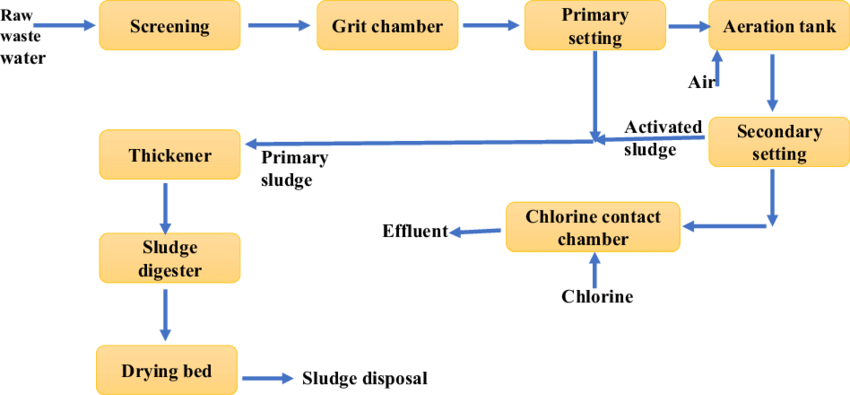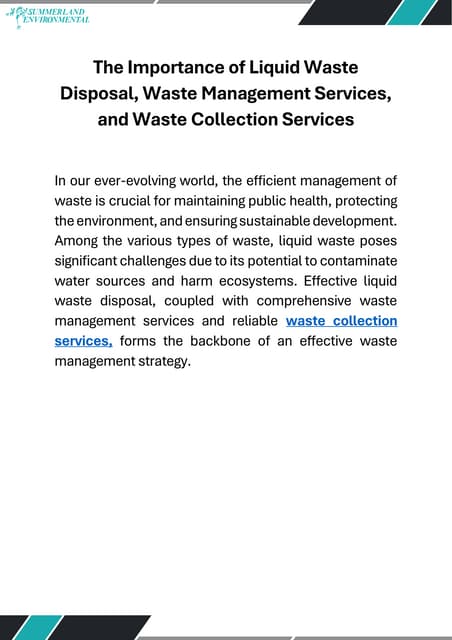Things about Reclaim Waste
Things about Reclaim Waste
Blog Article
Reclaim Waste Fundamentals Explained
Table of ContentsAbout Reclaim WasteHow Reclaim Waste can Save You Time, Stress, and Money.Top Guidelines Of Reclaim WasteThe Facts About Reclaim Waste RevealedReclaim Waste Can Be Fun For Anyone
Explore the kinds, incidents, and forms of fluid waste. Domestic sewer waste refers to the waste and products from a residential septic container. This kind of waste is created by human beings in homes, schools, and various other buildings. This only consists of septic systems that have a drain area. The proper monitoring and disposal of domestic sewer waste require fluid waste to be transferred to a sewer treatment plant where the appropriate methods and tools are applied to detoxify and throw away waste.
Industrial waste commonly consists of potential threats, such as flammable materials or a combination of liquid and strong waste items, and calls for an advanced and detailed disposal process. The disposal of business waste typically includes the filtering of waste prior to transport to ensure risk-free and correct disposal. Hazardous waste is created from by-products and overflow of commercial procedures and manufacturing.
This sort of waste can not use the exact same sewer monitoring transport or procedures as septic or business fluids. The industrial waste management process calls for the inspection and testing of fluid waste prior to it undertakes the disposal process (liquid waste disposal). Drainage waste is the fluid waste that originates from drainage and excess stormwater in very booming locations or cities
Drainage waste can create contamination and flooding if not managed properly. Discover more about sewer cleansing and waste monitoring. Ensuring proper waste management can prevent calamities and lower ecological injury. Both people in residential setups and professionals in commercial or manufacturing markets can benefit from understanding the procedures and guidelines of liquid waste management.
Fascination About Reclaim Waste
Contact PROS Solutions today to discover our waste management and disposal solutions and the correct methods to look after the liquid waste you create.
(https://fliphtml5.com/homepage/kekhp)Do you recognize what takes place to your water when you disengage, purge the commode or drain pipes the washing machine? No? Well, it deserves recognizing. This supposed 'wastewater' is not only an essential resource but, after therapy, will be launched to our land, waterways or the sea. Used water from commodes, showers, baths, kitchen area sinks, laundries and commercial procedures is called wastewater.

water utilized to cool down machinery or tidy plant and tools). Stormwater, a kind of wastewater, is drainage that moves from farming and urban areas such as roofs, parks, gardens, roadways, courses and seamless gutters right into stormwater drains, after rainfall. Stormwater streams unattended directly to local creeks or rivers, eventually getting to the ocean.
An Unbiased View of Reclaim Waste
In Queensland, a lot of wastewater is treated at sewage treatment plants. Wastewater is transferred from domestic or industrial websites via a system of sewage systems and pump terminals, understood as sewage reticulation, to a sewer therapy plant.
The Department of Natural Resources encourages city governments regarding handling, operating and preserving sewerage systems and treatment plants. In unsewered areas, regional federal governments might call for owners to set up individual or household sewer therapy systems to treat domestic wastewater from commodes, cooking areas, washrooms and washings. The Department of Natural Resources authorizes using home systems when they are shown to be effective.
A lot of stormwater receives no therapy. In some brand-new neighborhoods, therapy of some stormwater to get rid of litter, sand and gravel has begun making use of gross contaminant traps. Wastewater therapy occurs in 4 stages: Removes strong matter. Bigger solids, such as plastics and other things incorrectly released to drains, are removed when wastewater is gone through screens.
Makes use of tiny living organisms recognizes as micro-organisms to damage down and remove staying liquified wastes and great fragments. Micro-organisms and wastes are incorporated in the sludge.
The Buzz on Reclaim Waste
Nutrient removal is not available whatsoever sewage treatment plants because it calls for costly you can look here specialised devices. It is ending up being extra usual in Queensland. Clear fluid effluent created after treatment might still consist of disease-causing micro-organisms. If this effluent is launched into waterways such as rivers or the sea, the micro-organisms will eventually die out.

This generally indicates wastewater has actually to be treated or pollutants removed prior to it can be discharged to rivers. A lot of wastewater flows into the sewerage system. Under the Act, local federal governments provide approvals and permits for eco relevant activities (ERAs) involving wastewater launches that may have a local influence. The department administers authorizations and licences to Ages involving wastewater launches that may have a local or statewide effect.
The Only Guide to Reclaim Waste
Or else, samples are considered research laboratory evaluation. Commonly lots of tests are required to establish the levels of each of the various toxins such as oils, hefty metals and chemicals in water. Surveillance provides factual info about water top quality and can verify that licence problems are being met. The information acquired with monitoring provides the basis for making water top quality decisions.
Report this page